Introduction
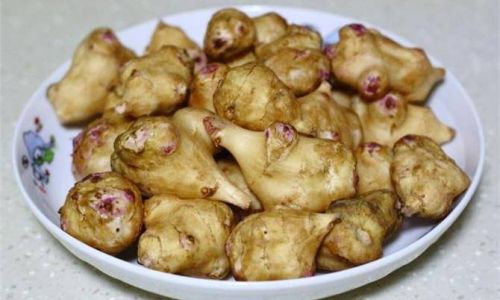
In the realm of culinary preservation, pickling stands as a timeless art form that transforms seasonal produce into delightful, long-lasting delicacies. Among the myriad of vegetables that lend themselves beautifully to the pickling process, Jerusalem artichokes (also known as sunchokes) offer a unique and underappreciated flavor profile. With their knobby appearance and nutty, slightly sweet taste, these tuberous roots are an excellent candidate for transforming into a variety of pickled delights. This comprehensive guide explores the intricacies of pickling Jerusalem artichokes, offering a multitude of recipes and techniques to ensure your preservation endeavors yield flavorful, crunchy, and visually appealing results.
Understanding Jerusalem Artichokes
Before diving into the pickling process, it’s crucial to understand the basics of Jerusalem artichokes. Native to North America, these tubers are members of the sunflower family and are unrelated to true artichokes despite their name. They thrive in cool climates and are often harvested in the autumn, providing a nutritious and versatile food source. Jerusalem artichokes are rich in dietary fiber, vitamins, and minerals, making them a valuable addition to any diet.
When selecting Jerusalem artichokes for pickling, look for firm, smooth tubers with no signs of mold or soft spots. Smaller tubers tend to be more tender and flavorful, but larger ones can be used as well, provided they are properly trimmed and prepared.
The Importance of Preparation
Proper preparation is key to successful pickling. Begin by thoroughly washing the Jerusalem artichokes to remove any dirt or debris. Peel the tubers if desired, though some recipes call for leaving the skin on for added texture and nutrients. Cut the tubers into uniform pieces to ensure consistent pickling and cooking times. Soaking the pieces in a solution of water and a small amount of vinegar or lemon juice can help prevent discoloration.
Basic Pickling Principles
Pickling involves submerging food in a brine or vinegar solution that contains acid, salt, and sometimes sugar or spices. This process preserves the food by inhibiting the growth of harmful bacteria while enhancing its flavor. The acidity level of the pickling liquid is crucial; it should be sufficient to create a safe preservation environment.
Types of Pickling Brines
-
Vinegar-Based Brines: The most common type of pickling brine, vinegar-based solutions can range from mild rice vinegar to robust cider or distilled white vinegar. The type of vinegar chosen will influence the final flavor of the pickled Jerusalem artichokes.
-
Salt-Brined Fermentation: This traditional method relies on natural fermentation to create lactic acid, which preserves the food. Salt-brined fermentation requires careful monitoring to ensure the right balance of salt and conditions to prevent harmful bacteria growth.
-
Sugar-Based Brines: Often used in sweet pickles, sugar-based brines combine vinegar with sugar to create a balanced, tangy-sweet flavor. These are less common for Jerusalem artichokes but can yield delightful results when done correctly.
Spices and Flavorings
The beauty of pickling lies in its versatility. Experiment with various spices and flavorings to create unique and memorable pickled Jerusalem artichokes. Common spices include garlic, dill, mustard seeds, and bay leaves. Herbs like thyme, rosemary, and oregano can also add layers of complexity. For a sweet-and-spicy twist, consider adding chili flakes, ginger, or cinnamon.
Equipment Needed
-
Clean, Sterilized Jars: Glass jars with tight-fitting lids are ideal for pickling. Ensure they are thoroughly cleaned and sterilized to prevent contamination.
-
Large Pots: For boiling the pickling brine and blanching the Jerusalem artichokes.
-
Tongs or Slotted Spoon: For handling the hot, pickled tubers without burning yourself.
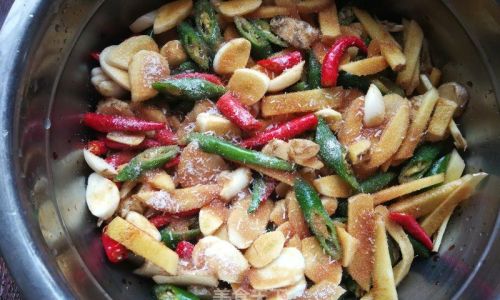
-
Measuring Cups and Spoons: For accurate ingredient measurement.
-
Funnel: For pouring the brine into jars without spilling.
-
Clean Cloth or Paper Towels: For wiping any excess brine from jar rims before sealing.
Recipes for Pickled Jerusalem Artichokes
Classic Dill Pickled Jerusalem Artichokes
Ingredients:
- 2 pounds Jerusalem artichokes, peeled and sliced into uniform pieces
- 2 cups distilled white vinegar
- 1 cup water
- 1/4 cup sugar
- 2 tablespoons pickling salt
- 4 garlic cloves, thinly sliced
- 2 sprigs fresh dill
- 1 teaspoon mustard seeds
- 1 teaspoon black peppercorns
Instructions:
- In a large pot, combine vinegar, water, sugar, and salt. Heat until the sugar and salt are fully dissolved.
- Add garlic, dill, mustard seeds, and peppercorns to the brine. Bring to a simmer and let it cook for 5 minutes to infuse the flavors.
- Meanwhile, blanch the Jerusalem artichoke pieces in boiling water for 2-3 minutes. Drain and plunge into ice water to stop the cooking process.
- Pack the blanched artichokes into clean, sterilized jars. Pour the hot brine over the artichokes, ensuring they are completely submerged.
- Wipe the rims of the jars clean and seal with tight-fitting lids. Let the jars cool to room temperature before storing them in a cool, dark place for at least 2 weeks before enjoying.
Sweet and Spicy Pickled Jerusalem Artichokes
Ingredients:
- 2 pounds Jerusalem artichokes, peeled and quartered
- 2 cups apple cider vinegar
- 1 cup granulated sugar
- 1/4 cup water
- 2 tablespoons pickling salt
- 4 red chili peppers, thinly sliced (adjust to taste)
- 1-inch piece of fresh ginger, thinly sliced
- 2 cinnamon sticks
- 1 teaspoon whole cloves
Instructions:
- In a large pot, combine vinegar, sugar, water, and salt. Heat until the sugar and salt are fully dissolved.
- Add chili peppers, ginger, cinnamon sticks, and cloves to the brine. Bring to a simmer and let it cook for 10 minutes to meld the flavors.
- Blanch the Jerusalem artichoke pieces as described in the previous recipe.
- Pack the blanched artichokes into clean, sterilized jars. Pour the hot, spicy brine over the artichokes, ensuring they are fully submerged.
- Wipe the rims of the jars clean and seal with tight-fitting lids. Allow the jars to cool to room temperature before storing them in a cool, dark place for at least 3 weeks to allow the flavors to develop.
Fermented Pickled Jerusalem Artichokes
Ingredients:
- 2 pounds Jerusalem artichokes, peeled and sliced into thin rounds
- 2 tablespoons pickling salt
- Filtered water (enough to cover the artichokes)
- 2 garlic cloves, thinly sliced
- 1 sprig fresh dill
- 1 teaspoon black peppercorns
Instructions:
- In a large, non-reactive bowl, combine the Jerusalem artichokes and salt. Toss to coat the tubers evenly with salt.
- Cover the artichokes with filtered water, ensuring they are fully submerged. Weight down the artichokes with a clean, heavy plate to keep them submerged.
- Cover the bowl with a clean cloth or cheesecloth and secure it with a rubber band. Place the bowl in a cool, dark place.
- Ferment the artichokes for 3-7 days, checking daily to ensure they remain submerged and to monitor for any off-odors or mold. Taste daily until the desired level of tanginess is achieved.
- Once fermented to your liking, transfer the artichokes and their brine to clean, sterilized jars. Add garlic, dill, and peppercorns to the jars. Ensure the artichokes are fully submerged.
- Wipe the rims of the jars clean and seal with tight-fitting lids. Store in the refrigerator for up to several months.
Honey-Mustard Pickled Jerusalem Artichokes
Ingredients:
- 2 pounds Jerusalem artichokes, peeled and cut into sticks
- 1 1/2 cups apple cider vinegar
- 1/2 cup honey
- 1/4 cup mustard seeds
- 2 tablespoons pickling salt
- 1 onion, thinly sliced
- 2 carrots, peeled and thinly sliced
- 1 teaspoon turmeric powder (optional, for color)
Instructions:
- In a large pot, combine vinegar, honey, mustard seeds, salt, and turmeric powder (if using). Heat until the honey and salt are fully dissolved.
- Add the sliced onion and carrots to the brine. Bring to a simmer and cook for 5 minutes to infuse the flavors.
- Blanch the Jerusalem artichoke sticks as described in the previous recipes.
- Pack the blanched artichokes, onions, and carrots into clean, sterilized jars. Pour the hot, honey-mustard brine over the vegetables, ensuring they
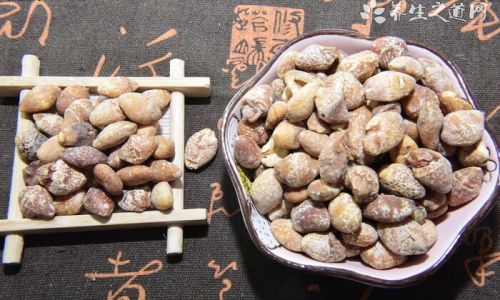
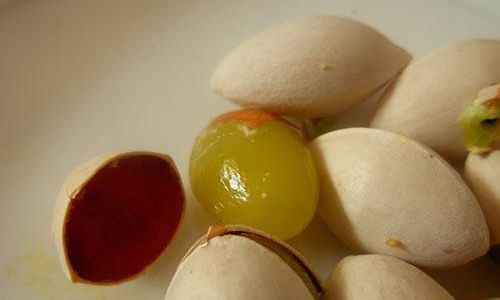
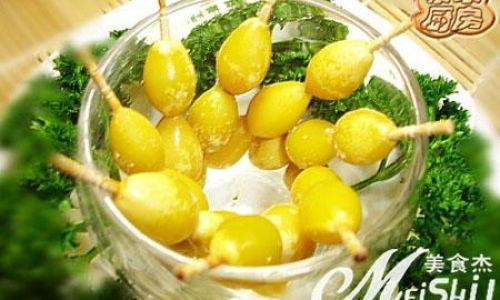
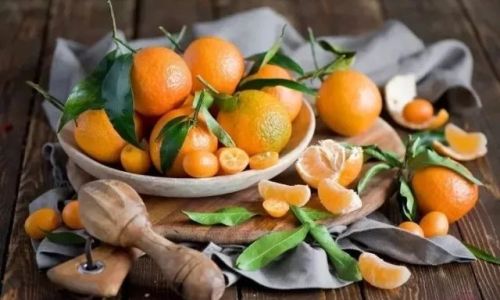
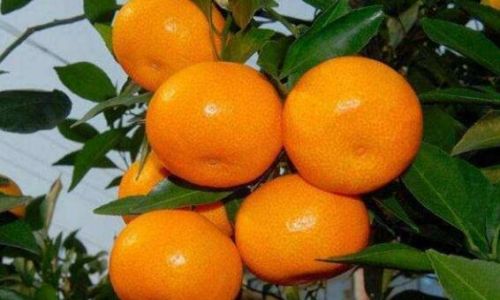
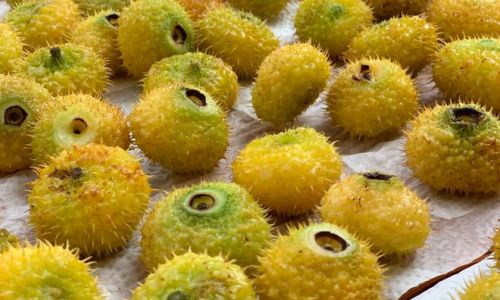
0 comments